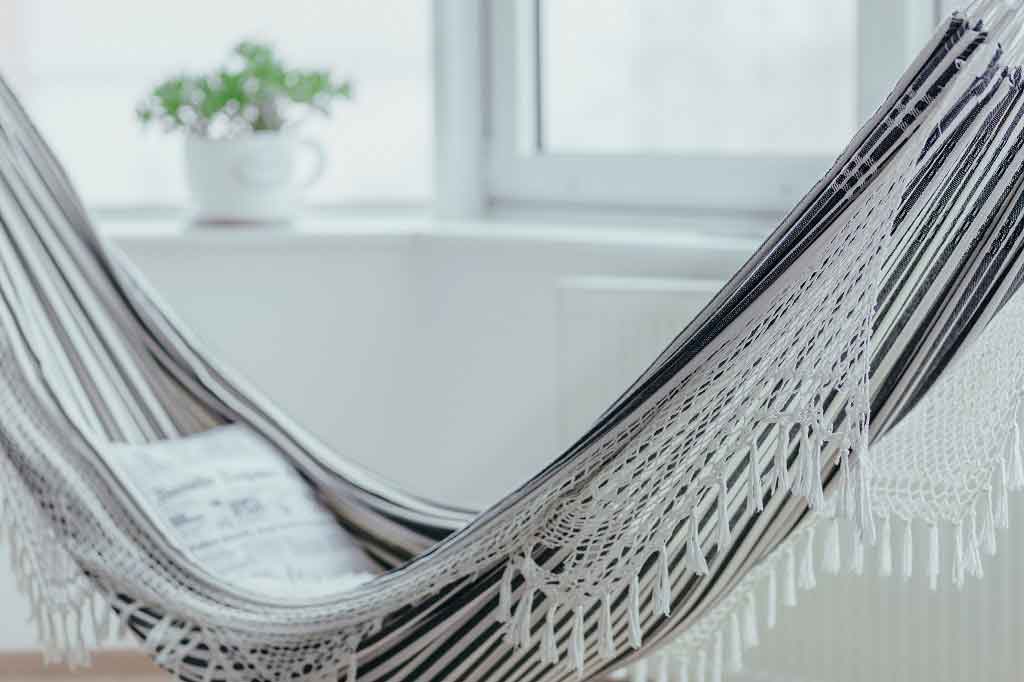Do hammocks aid sleep? Don't be swayed

“If you struggle to get off to sleep at night, maybe you should try reclining in a hammock,” said the Daily Mail. The news is based on a small sleep study which found that lying on a slowly rocking bed...
“If you struggle to get off to sleep at night, maybe you should try reclining in a hammock,” said the Daily Mail.
The news is based on a small sleep study which found that lying on a slowly rocking bed can help the transition into sleep, and that rocking also alters the type of sleep experienced. Researchers say that these changes in brain and sleep behaviour could explain why humans find rhythmic rocking to be soothing, for example when mothers rock their babies.
While this research is interesting, it was only a small study and its results were based on 10 healthy men who did not normally have sleep problems. It also only looked at the effect of rocking on a 45-minute afternoon nap rather than a whole night’s sleep. Given the limited scope of this research, it remains to be seen whether rocking might be able to help treat sleep disorders such as night-time insomnia.
Where did the story come from?
The study was carried out by researchers from the University of Geneva, Geneva University Hospital and the University of Lausanne in Switzerland, and the Université Paris Descartes in France. It was funded by the Swiss National Science Foundation. The study was published in the peer-reviewed scientific journal Current Biology.
The media generally reported the story accurately. However, many articles gave the impression that the study took place in a hammock, whereas it was performed in a type of slowly moving bed. It should also be noted that none of the study participants had sleep disorders such as insomnia. It has yet to be determined whether rocking could help treat insomnia.
What kind of research was this?
This small-scale sleep study compared sleep during an afternoon nap in which a bed was either stationary or rocking. It aimed to demonstrate that gentle rocking can change types of sleep experienced during a short afternoon nap. The study’s design was appropriate, but the study would have to be performed in greater numbers of participants before general conclusions could be drawn.
What did the research involve?
Twelve healthy male volunteers, aged 22–38 years old, had two 45-minute afternoon naps (lasting from 2.30pm to 3.15pm) on a bed that either remained stationary or rocked gently at a rate of one full rock every four seconds.
The participants were good sleepers who did not have excessive daytime sleepiness and did not normally nap in the afternoon. Participants all had low anxiety levels and had enjoyed a good quality and quantity of sleep for three nights before each afternoon nap. This was determined using sleep questionnaires and from measurements of motor activity.
The two naps were at least one week apart, and the order in which the participants slept on the rocking or stationary bed was randomly determined. The naps took place in complete darkness, at a controlled temperature (21°C) and with the same amount of background noise (37 decibels). During the naps, the researchers continuously took multiple measurements of physiological changes and brain function. Sleep stages and brain activity were then classified from the measurements by sleep experts who were blinded to the experimental conditions. The volunteers also completed sleep questionnaires and their motor activity was recorded.
The data from 10 of the 12 participants were analysed. The data from one participant were excluded because he had elevated anxiety levels which prevented him from falling asleep during one of the naps, and technical problems prevented sleep measurements from being recorded during one other participant’s nap.
What were the basic results?
Eight participants rated the rocking bed as more pleasant than the stationary bed, one participant found both conditions equally pleasant and one preferred the bed stationary.
The researchers found that rocking accelerated sleep onset. Sleep normally happens in cycles of non-rapid eye movement (NREM) and rapid eye movement (REM). NREM is further divided into three types: N1, N2 and N3. A sleep cycle normally follows the pattern: N1-N2-N3-N2-REM.
The researchers found that N1 sleep duration was shorter on the rocking bed (about 30% of total sleep time) compared to on the stationary bed (about 50%). The duration of N2 sleep was greater on the rocking bed (about 66% of total sleep time) than on the stationary bed (about 46%). Rocking also modified brain activity during N2 sleep. The brain activity observed was characteristic of deep sleep. These brain changes were observed across all the volunteers.
How did the researchers interpret the results?
The researchers suggest that rhythmic rocking enhances “synchronous activity” in the brain, which could “promote the onset of sleep and its maintenance”.
Conclusion
This study showed that falling asleep is aided by gentle rocking, and that rocking can affect the sleep cycle. However:
- This was a small study with only 12 participants, of whom only 10 where included in the final analysis. Also, the study only included male participants.
- A previous study looked at whole-night sleep and found that rocking does not consistently affect N1 sleep, although it did reduce the percentage of the deeper-stage N2 sleep. However, it did not look at how the ease of falling asleep was affected.
- None of the volunteers in this study had any problems falling asleep. It remains to be determined whether rocking can be used to treat insomnia or other sleep disorders.







 Subscribe
Subscribe Ask the doctor
Ask the doctor Rate this article
Rate this article Find products
Find products